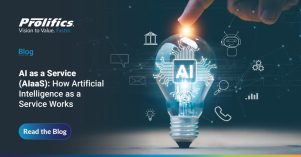Post Author – Rajeev Sharma, Senior Architect and Competency Lead, Prolifics
The concept of the industrial metaverse is becoming increasingly popular in technology and innovation. The “metaverse” refers to a virtual world where people can interact with digital objects and each other in a fully immersive environment. While this concept was initially tied to gaming and entertainment, today it is powering new possibilities in industrial automation trends, metaverse manufacturing, and Industry 4.0.
Did you know that by 2030, the global metaverse market is expected to surpass $900 billion, with a significant portion linked to industries outside of gaming? The industrial metaverse is one of the most promising applications of this shift. Unlike its entertainment-focused cousin, the industrial metaverse integrates virtual environments, digital twin technology, and immersive simulations into real-world industrial operations.
In industrial settings, automation relies on technology and computer systems to control and monitor processes with greater accuracy and safety. The industrial metaverse enhances this by enabling real-time collaboration, monitoring, and simulation—without requiring a physical presence. As industries explore metaverse applications in manufacturing, they gain opportunities to improve efficiency, reduce risk, and accelerate decision-making.
Let’s highlight some value adds and advantages of utilizing the metaverse in industrial automation:
1. Accessibility Without Physical Presence
One of the most impactful industrial metaverse use cases is remote accessibility. Workers can monitor and control processes from anywhere in the world—an invaluable benefit in hazardous environments like chemical or nuclear plants. By integrating digital twin technology, factories can visualize operations virtually, ensuring safer and smarter control without the risks of exposure.
2. Effective Training and Collaboration with VR & AR
The role of AR and VR in industrial automation is critical for employee training and team collaboration. Instead of relying on physical equipment, companies can train staff using immersive simulations, cutting costs and risks. Real-world scenarios—such as equipment breakdowns or emergencies—can be replicated in a safe virtual environment. This improves response times, collective decision-making, and long-term workforce readiness.
3. Better Analysis and Insights with Digital Twins
The industrial metaverse makes it possible to visualize complex data and processes in 3D environments. Using digital twin technology, organizations can mirror production lines virtually and monitor systems in real time. This provides deeper insights into process inefficiencies and enables quick corrective actions. By learning how to implement digital twin in manufacturing, companies can bridge the gap between physical assets and digital monitoring—leading to faster innovation and predictive maintenance.
4. Driving Agility with a Fail-Fast Strategy
Manufacturers often hesitate to adopt new technologies due to costs and risks. However, the industrial metaverse enables safe experimentation through synthetic data, AI, AR, and VR. This supports a “fail-fast” strategy, allowing manufacturers to test different scenarios and evaluate outcomes before scaling them. For industries focused on agility, this highlights how industrial metaverse improves efficiency and accelerates innovation.
5. Reliable Smoke Tests Before Go-Live
Another major advantage lies in simulation. With digital twin technology, manufacturers can validate both external functionality and internal core features in near real-time before deployment. This acts as a reliable smoke test, reducing downtime, costs, and unexpected failures. For companies seeking the benefits of metaverse for factory automation, this ensures higher confidence before large-scale rollouts.
6. Connected Worker Experiences and Smart Factories
At Prolifics, one of our offerings is the “Industrial Metaverse & Connected Worker Experiences.” This enhances the work environment for industrial workers using wearables, smart devices, and IoT-enabled tools. When combined with AI, computer vision, and natural language processing (NLP), these tools empower workers to receive real-time insights, predictions, and step-by-step guidance. Such innovations define the future of industrial operations with metaverse by bridging human expertise with intelligent systems.
Challenges of Industrial Metaverse Adoption
Despite its potential, industries face barriers to adoption. High infrastructure costs, lack of standardization, data privacy concerns, and workforce training gaps are among the key challenges of industrial metaverse adoption. Overcoming these hurdles will require careful planning, stakeholder alignment, and incremental deployment strategies.
Conclusion
The industrial metaverse is not just a futuristic concept—it is already shaping the present and future of metaverse manufacturing and industry 4.0. With its ability to enhance safety, boost efficiency, and foster innovation through digital twin technology and immersive collaboration, the possibilities are limitless. While challenges exist, the benefits of metaverse for factory automation are too significant to ignore. As industries embrace these innovations, the future of industrial operations with metaverse will unlock new levels of productivity, agility, and resilience.




